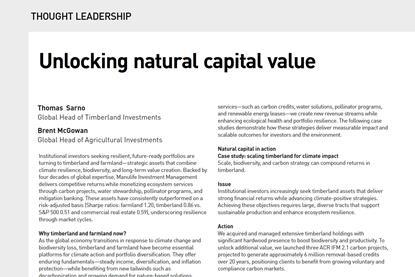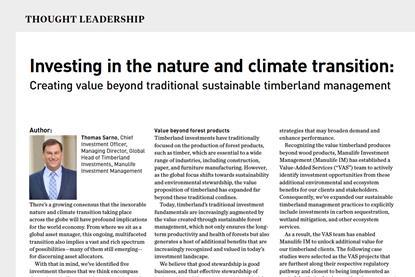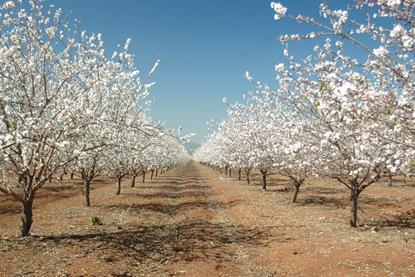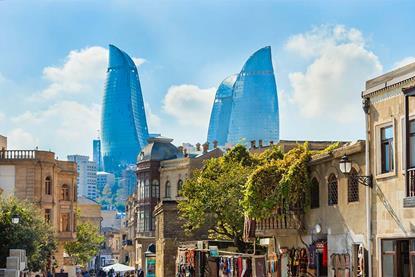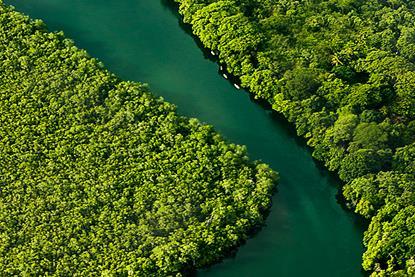Content (37)
-
White papers
Unlocking natural capital value
Institutional investors seeking resilient, future‑ready portfolios are turning to timberland and farmland—strategic assets that combine climate resilience, biodiversity, and long‑term value creation.
-
White papers
Why invest in sustainably managed timberland?
Unlock the potential of timberland investing. Discover how sustainable timberland investment can offer attractive risk-adjusted returns, reliable income, and real asset diversification—while acting as a proven inflation hedge investment. As awareness of the social and environmental benefits of natural capital investing grows, learn how timberland can support both financial performance and positive ecosystem impact.
-
White papers
Investing in the nature and climate transition: Creating value beyond traditional sustainable timberland management
There’s a growing consensus that the inexorable nature and climate transition taking place across the globe will have profound implications for the world economy. From where we sit as a global asset manager, this ongoing, multifaceted transition also implies a vast and rich spectrum of possibilities—many of them still emerging— for discerning asset allocators.
-
White papers
Adaptation is resilience: Assessing physical climate risk in Canada’s provinces and municipalities
We collaborated with our partners at Concordia University and the Emerging Risks Information Center (ERIC) to assess physical climate risk across Canada’s provinces and municipalities, particularly their exposure to and preparedness for natural disasters. This abridged version of our study highlights key research findings and conclusions.
-
White papers
Catch the AI wave: water risk in big tech
Access to usable fresh water is fundamental to livelihoods, health, ecosystems, and the global economy. Water-related natural hazards such as floods and droughts can have such devastating effects that we believe that water-related risks and opportunities can be financially material factors that need to be increasingly integrated into technology sector decisions and the investment strategies that support them.
-
White papers
Going long on permanent crops: long-term demand fundamentals of almonds and pistachios
Understanding the supply-and-demand fundamentals of tree nuts is critical for investors considering long-term investments in the agriculture sector.
-
White papers
A thematic framework for investing in the nature and climate transition
We’ve identified five broad investment themes that comprehensively address the challenges of climate change and nature loss.
-
White papers
2024 timberland investment performance set to meet or exceed 2023
Last year’s U.S. private timberland investments look likely to overtake their previous year’s performance. As we await full-year reporting inclusive of annual valuations through appraisals or market transactions, this performance could offer an indication of what to expect for 2025.
-
White papers
COP29 and related announcements set the stage for the expansion of high-integrity carbon markets
Decisions made at and around the UN Climate Conference (COP29) in Baku reinforce the key role that carbon markets fueled by private capital will play in facilitating global ambitions to counter climate change.
-
White papers
Timberland investing with Manulife Investment Management
How have approaches and strategies within sustainable forestry investment changed over the years? What new opportunities and co-benefits are available in addition to the stability and resilience these assets provide?
-
White papers
A thematic framework for investing in the nature and climate transition
We’ve identified five broad investment themes that comprehensively address the challenges of climate change and nature loss.
-
White papers
The fundamentals of sustainable forestry investing
Sustainable timberland investments offer investors traditional portfolio diversification benefits alongside new opportunities for positive impact, say Manulife’s Thomas Sarno, David Fortin and Mary Ellen Aronow.


